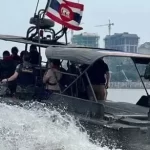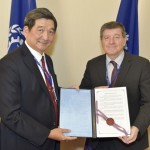
Another court in southern Thailand issued 50 more arrest warrants last week at the request of police for suspected members of a syndicate involved in human trafficking, as police said some of the suspects may be government officials. Two days earlier, a different court issued arrest warrants for four members of the military on trafficking charges.
Thai courts have now issued 153 arrest warrants for suspects allegedly directly involved in human trafficking, including members of the military, police and local governments. A total of 90 suspects are already in custody. Another 77 warrants have been issued for suspects allegedly involved in money laundering for human traffickers and 37 are already under arrest.
Deputy Prime Minister Pravit Wongsuwan said last week that he expects even more warrants will be issued in the near future as the syndicate has more accomplices. He added that the government will complete its amendments to the Anti-Human Trafficking Law by November 15.
The arrest warrants stem from the discovery of five truckloads of trafficked Rohingya Muslim migrants from Myanmar at a police checkpoint in northeastern Thailand in January. Arrests made at that time provided police with leads that led to the discovery of virtual prison camps and graves of trafficking victims in May near the border with Malaysia. More camps and graves were found inside Malaysia itself. The discoveries broke the case open and led to the 153 arrest warrants.
Despite complicity of some officials in human trafficking, other officials have been giving their all in the crusade against the crime. Shana Wamuhu, a recent graduate of Tulane University law school and who spent this summer working in the Attorney General’s office in Thailand, told the News From Tulane website that she met Thai role models “who are not only passionate about the fight against human trafficking but also emulate the values of honor and integrity.”
The website reported that during her time at the Attorney General’s office, Wamuhu attended a four-day meeting between Thailand and Myanmar on transnational crimes; took part in a regional event hosted by Microsoft on using technology in fighting human trafficking; accompanied a prosecutor to the interrogation of three accused robbers; and observed a hearing on compensation for sex-trafficking victims. She also researched possible solutions to the humanitarian crisis surrounding Rohingyas.
For more information and updates about Thailand’s policies and actions against trafficking in persons and related issues, visit www.thaianti-humantraffickingaction.org
—————————-
Thailand Focus September 28, 2015




